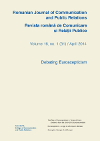Euroscepticism – a sign of a Europe in distress
Euroscepticism – a sign of a Europe in distress
Author(s): Paul Dobrescu, Flavia DurachSubject(s): Social Sciences
Published by: Editura Comunicare.ro
Keywords: Euroscepticism; Eurobarometers; public opinion; European Union; economic crisis
Summary/Abstract: Euroscepticism is explicitly or implicitly considered a product of the crisis, a result of Europe’s recent difficult moments. The secondary data analysis of official Eurobarometer results between 2009 (EB71) and the end of 2013 (the latest data available – EB80) in 17 member states, grouped around the axis North – South – East, leads us to the conclusion that Euroscepticism has amplified during the years of economic crisis following a particular pattern. We witness the rise of inequalities in a Union of equals, with significant differences in terms of public opinion in the North and in the South. The great disappointment, the gloom mood of the citizens from Greece, Cyprus, Spain, Portugal and, surprisingly, France, in contrast with the self-confident attitude of Germans and the mild enthusiasm of Eastern European countries suggest that the EU did not emerge stronger as a whole. Multiple divergences have already started to occur between the rich and the poor member states, between competitive regions and regions that lag behind, between debtors and creditors, between the North and the South and, we dare to anticipate, between the West and the East. The game is changing and Euroscepticism is now the expression of confusion and fear, more than of righteous opposition against particular issues or concerns.
Journal: Revista Română de Comunicare şi Relaţii Publice
- Issue Year: XVI/2014
- Issue No: 1
- Page Range: 25-40
- Page Count: 16
- Language: English

